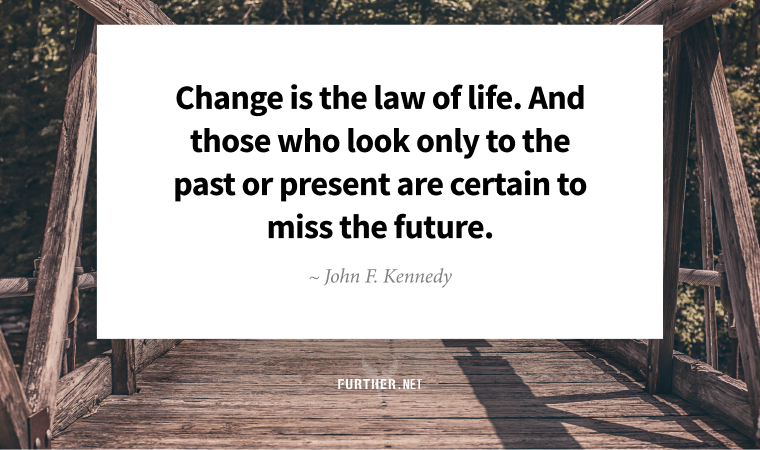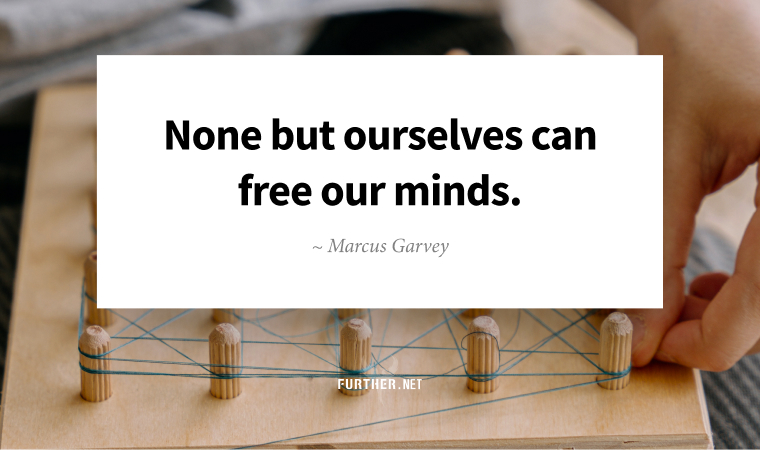Three Steps to Making a Big Life Change 
Midlife is ripe for reinvention. That's why Further focuses so much on the dynamics of change. Adding to the natural inclination to reevaluate the path we're on at this age, we've had the disruption of COVID-19. And that's given just about everyone an opportunity to reflect on a career change. In an online poll about how the pandemic had affected plans for career change, 49% of respondents chose this response: "It has given me downtime to rest and/or think." That's a crucial step that too many people don't take. But thinking about change can only get you so far. That's left a lot of people in limbo between how things used to be, and how they would prefer them to be. And that state leaves you susceptible to getting sucked back into the old ways, even though you now realize that's no longer what you want. So how do we avoid staying stuck and start making progress toward what we've realized we really want? It's time to stop thinking and start taking transitional action: Research on the transformative potential of a catalyzing event like the coronavirus pandemic suggests that we are more likely to make lasting change when we actively engage in a three-part cycle of transition -- one that gets us to focus on separation, liminality, and reintegration. Let's dive into each of the three steps a bit: 1. Separation: In order to change, you need to adopt a new identity. And that means finding a way to separate from the old you, which requires separation. It takes 'habit discontinuity," which happens when we're separated from the people and places that trigger old habits and old selves. Those who moved somewhere new during the pandemic, for example, have a better chance of making life changes that stick. 2. Liminality: Liminal means "at or on both sides of a threshold." And an interlude is essentially a break or intermission. So "liminal interludes" give us the ability to do new and different things with new and different people. From that we learn about ourselves and cultivate new knowledge, skills, resources, and relationships. Then we apply what we've experienced into a new career path. 3. Reintegration: No, this is not the title of The Cure's final album. At some point, you've got to throw yourself back into the world of work in your new role, while not making the same mistakes. The typical pattern after we receive some sort of wake-up call is simply to revert back to form once things return to "normal." To truly experience a "new normal," you've got to continue to avoid the old cues and triggers that you separated from initially. For more detail and examples, check out: The 3 Phases of Making a Major Life Change (Harvard Business Review) Keep going- Brian Clark P.S. Someone not into what you're doing? Tell them if they don't like your peaches, don't shake your tree. Yes, that inspired this week's Flashback. New to Further? Join us here. The Eating-Thinking Connection The link between the food we consume and the ways in which we make decisions go beyond how much we eat. An evolving body of research explores how bacteria composition and hormonal activity in the gut communicate with the brain and vice versa, possibly helping to determine our overall health and well-being. The Neuroscience of Eating (Insead) Stranger Danger? Relationships are essential to living a long, fulfilling life -- and even "weak" connections are beneficial. That extends to interactions with complete strangers, which we should strive to do more of (for all sorts of good reasons). The Surprising Benefits of Talking to Strangers (The Atlantic) Tiny Real Estate Traditional wisdom suggests it's usually a good move to invest in real estate. Fortunately, there are a few ways you can realize some upside from the hot housing market even if you don't have a truckload of cash to invest. How to Invest in Real Estate Without a Lot of Money (Lifehacker) Think Better While school taught us how to solve problems, is didn't necessarily teach us the art of thinking. No skill is more valuable and harder to come by than the ability to critically think through problems that you haven't encountered before. How to Think: The Skill You've Never Been Taught (Farnam Street) Nomadic Notes If you're working remotely and eager for adventure, becoming some form of digital nomad may be appealing to you. Here are some tips from someone who is living the life. 6 Tips for Starting out as a Digital Nomad (Afar) 
By Trudi Roth Strength and stamina are as much psychological as they are physical. Thanks to world-class athletes like Simone Biles and Naomi Osaka, it's now clear resilience isn't about powering through mental health challenges. Instead, it's about training yourself to perform under pressure, which includes knowing when to walk away before irreparable damage is done -- to you and those around you. You can prepare for challenges by taking a page out of the elite athlete's playbook to boost your fortitude and focus for grace under pressure. Mental Gymnastics Performance-driven pros aren't the only people who need help facing life's challenges. We all could use a daily mental health check, especially when facing an ongoing stressor like COVID. Since the 1930s, when the Chicago Cubs used sport psychologist Coleman Griffith to bolster their cognitive readiness, top athletes rely on mental skills coaches to help them get and stay in the zone. While regular coaching might involve leading athletes in repetitive drills and scrimmages, mental skills coaches supply athletes with a suite of psychological tips and tricks to instill a winning mindset, like sharpening on-field focus, brushing up confidence, and winnowing distractions. Strategies psychological trainers use include: - "Imagery training": Picture yourself achieving a goal in sharp sensory detail. What does it look, sound, and feel like?
- "Pressure training": Purposefully increase your stress levels by doing a practice run in front of a crowd or with a friend who asks provocative questions.
- Lighten up: Beat overthinking by having a good chuckle. Watch a funny video or do a goofy dance to break negative rumination patterns.
And then, of course, there's the ultimate pro move that will help you go out on top without taking anyone else down with you. Know When to Quit Just as the "twisties" guided Simone Biles to drop out of Olympic competition, I used to view my severe anxiety as a barometer to know when it's time to make a change. Today I know that's a lousy way to live. Instead, I turn to stress-reducing practices like meditation or walking to manage my anxiety proactively. Yoga practitioners recommend identifying your "point of pleasant tension," where stretching yourself is challenging but not incapacitating. It's also helpful to look at the goal you're chasing and decide if it's still worth it. Finally, self-care is crucial. Success shouldn't come at the expense of your mental health, so take time to assess the toll endeavors take on you before and after an event. Then, do what feels good to you to release bliss chemistry and relax. Ultimately, mental fitness is the dividing line between breaking down and breaking through. Real champions rely on their brain, not their brawn, to do what it takes to live to fight another day. Simone Biles Is A Role Model For Mental Fitness: 3 Ways To Learn By Her Example, From A Clinical Psychologist (Mindbodygreen) An Athletic Coach for the Mind? (New York Times) further: flashback  Steve Miller Band - The Joker The Joker, 1973 Steve Miller Band - The Joker The Joker, 1973 In addition to something about peaches and shaking a tree, The Joker by Steve Miller Band contains perhaps the most enigmatic line in rock history: "Some people call me Maurice, 'cause I speak of the pompatus of love." (YouTube) further: sharing  Share with friends, get cool Further gear! Share Further with friends and earn rewards. Simply give them your unique referral link or use one of the sharing icons below. PS: You have referred 0 people so far. | Thank you for sharing Further! | 










No comments:
Post a Comment